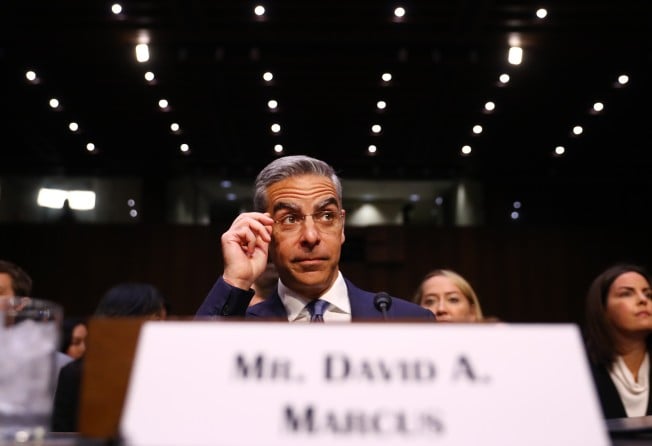Why Facebook’s Libra cryptocurrency has banks and regulators scrambling to respond
- The cryptocurrency could massively disrupt the existing system, by undermining government sovereignty over local currencies and allowing capital flight, even threaten half of banks’ turnovers

Facebook’s announced plans to launch a global digital currency, Libra coin, is reminiscent of Apple’s announcement in early 2007 that it would launch the first iPhone later that year. Both initiatives improved rather than disrupted existing products and came from an established company in a different industry. The iPhone was a better version of Nokia’s smart handset, while Facebook is offering to retail consumers cryptocurrency, which some banks are already using in wholesale settlements.
As industry boundaries blur, regulators scramble to keep up. Amazon has applied to offer telephony services, Singtel may apply to become an online bank, and JPMorgan Chase has plans to upend health care. In Hong Kong, HSBC will face competition from Tencent and Alibaba, whose subsidiaries have virtual banking licences.
Why are established companies moving into new industries? Modern communications technology has made automation essential for firms to retain their competitive edge. Any product or service with a digital component, no matter how regulated, is fair game for new entrants, new market structures, and new rules of competition that may require new regulations to keep the playing field level.
Regulators have not yet decided how to regulate platform companies that no longer merely sell widgets but instead form, and benefit from, new markets that their platforms facilitate. These companies connect consumers to third-party sellers, to one another, and often to advertisers by reselling consumers’ data. Mobile operators embraced the first iPhone via exclusive resale deals and customer contracts to subsidise handsets in return for subscriptions to operators’ service. Both Apple and mobile operators profited from such arrangements.
However, iPhone’s creation of a platform for app developers disrupted the mobile industry. Start-ups like WhatsApp and Instagram offered free services that reduced profits and prices for voice telephony and mobile roaming. Even before Facebook paid billions to buy them, these free services, with their troves of data and ability to bind consumers to a company’s ecosystem, disrupted the price-sensitive consumer segment of mobile users.
Now Facebook is disrupting again by copying the best attributes of cryptocurrencies, blockchain platforms and decentralised systems. To keep from getting disrupted, Facebook’s centralised operation is developing its own decentralised platform with a consortium, including payments companies and telcos. The move is a gentler version of the “kill zone” that big internet players used for years to acquire or smother start-ups that could challenge their dominance.
The announcement of Libra coin has prompted financial regulators to stop or delay the innovation before it has a chance to threaten governments’ sovereignty over their own currencies. This week, for example, the US Congress is holding hearings on the Libra initiative. Much of the criticism has also come from less developed countries that use capital controls to keep their citizens from selling down their local money in favour of more stable international currencies.
Libra coin promises to be the first stable digital currency available for international use, independent of any one regulator and tradeable at the retail level. Unlike JPMorgan’s stable coin for wholesale bank settlements or Alipay and WeChat Pay, linked to Chinese bank accounts and subject to one regulator’s control, Libra will be available to any consumer with an internet account.
To protect the supply of foreign reserves, less developed countries limit the amount of foreign exchange their citizens can buy. Even China, with the most reserves in the world, puts a US$50,000 per-year cap on individual residents’ purchases. Libra coin would let such people buy the digital equivalent of a foreign exchange, but few governments in less developed countries are likely to allow that without limiting the amount of permitted transactions. Otherwise, they risk capital flight.
In the past several years, central banks have been experimenting with issuing blockchain-based digital currencies – not for citizens’ use but for wholesale settlements among banks, including central banks. Central bankers have been leery of retail digital currencies and letting residents keep digital deposits at the central bank instead of at local bank branches. In any banking crisis, depositors would flee to the governmental safe haven. Such a shift in funds to central banks might cause runs on local banks and a collapse of the banking sector.
Libra will offer no interest to holders of its coin. Instead, the consortium will earn interest on invested funds from Libra buyers. In the US alone, every 1 per cent of M1 currency – the most liquid part of an economy’s money supply including cash – that Libra displaces would amount to US$37 billion, and 2 per cent interest on that equals US$740 million per year – a hefty return for a targeted consortium investment of US$1 billion.
Banks are now where telcos were a dozen years ago, facing disruption from digital competitors. Losing payments to Libra would put 10-15 per cent of revenues at risk, but a Libra consortium with a retail banking licence could threaten half of banks’ turnover. No wonder regulators and banks are rushing to respond.
Paul Ulrich has a background in financial economics and technology. His views do not necessarily reflect those of his employer, the GSMA, nor of its members or associate members